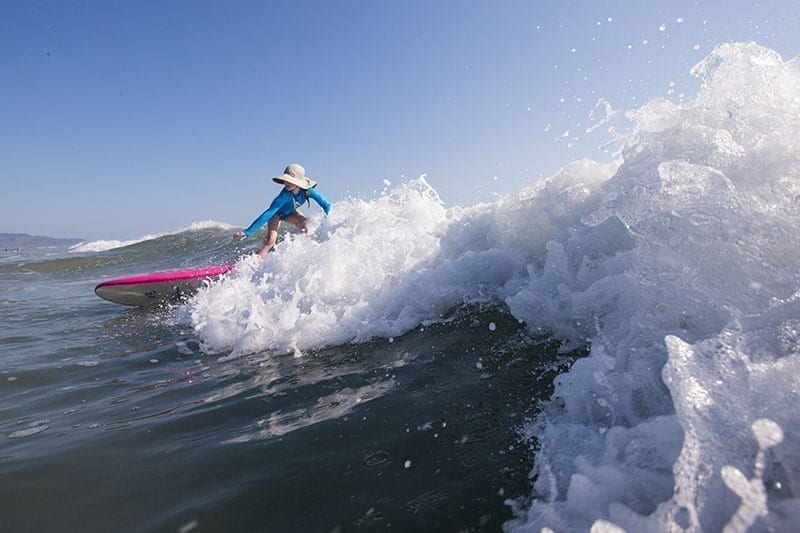Playa Santa Teresa is located on the southern cusp of the Nicoya Peninsula, an area internationally revered as a Blue Zone (one of five places in the world where a significant number of people are living extraordinarily long lives in great health and happiness). This thriving bohemian beach town is blessed with at least half a dozen common knowledge surf breaks that cater to different surfing abilities, wave preferences and swell size. Aside from being a tropical wave garden, Santa Teresa is also a haven for yogis, nature lovers, free-spirited good vibration-seeking travelers and locals alike.
How to get there
There are several viable options to get to Santa Teresa. It is a 4.5-hour drive from Liberia down a mix of paved and dirt roads but it is scenic and relatively easy. There are plenty of places to stop along the way to grab a coffee or an empanada, fill the tank or just stretch your legs. From San José, the best approach is to drive to Puntarenas and take the ferry across the Gulf of Nicoya to Paquera, then drive the remaining 90 minutes to Santa Teresa. Taking the ferry across is quite an enjoyable and beautiful experience. If driving isn’t your thing, Sansa flies from multiple destinations throughout Costa Rica, including Liberia and San José, to the small airport in Tambor, which is less than an hour away via taxi or private shuttle.
Where and when to surf
The best answer starts with a preliminary question: What is your experience level? It’s important to be realistic about your true surfing abilities to ensure you have a safe and enjoyable experience in the sea. There are breaks in Santa Teresa that are not beginner-friendly. Trying to surf there when inexperienced can result in frustration and worse, including injury to yourself or others.
Playa Santa Teresa has multiple peaks up and down the beach, but three breaks in particular attract most of the locals and visiting surfers: Suck Rock, Casa Cecilia, and La Lora Amarilla. Suck Rock and La Lora Amarilla are better suited for more experienced surfers, as the waves can be fast, hollow and heavy. On a big swell, Suck Rock has been known to hold double overhead to triple overhead waves on a higher tide. Casa Cecilia, on the contrary, has a reputation for being a novice-friendly wave when the tide is low and there isn’t too much swell in the water.
Playa Carmen is situated between Santa Teresa and Mal Pais. The rip currents are typically less strong here and when there isn’t a big swell, this beach break is a great place to learn and improve your surfing. The surf is typically best in the lower to mid-tide range.
Local companies
Santa Teresa is no longer the sleepy off-the-beaten path destination it once was. Since the early 2000s, it has blossomed into a booming beach town. There are accommodations and dining options for every budget, preference and taste, as well as multiple surf schools, surf shops, small supermarkets, boutique stores and bars. Santa Teresa is also a hot spot for surf and yoga retreats, including one of the best on the Nicoya Peninsula, Vajra Sol Surf and Yoga Retreat. Latitude 10, Florblanca, and Makanas Beachfront Bungalows are three highly recommended accommodation choices. Nalu Surf School and Blue Sanctuary Surf are two of the top schools, offering lessons, camps, and guiding for surfers at all levels, from total beginners to advanced. JTNDaWZyYW1lJTIwc3JjJTNEJTIyaHR0cHMlM0ElMkYlMkZ3d3cuZ29vZ2xlLmNvbSUyRm1hcHMlMkZlbWJlZCUzRnBiJTNEJTIxMW0xOCUyMTFtMTIlMjExbTMlMjExZDE1NzMzLjY1MjA5MDUzMzk1MyUyMTJkLTg1LjE3OTE0NzgwNTk5Mjg0JTIxM2Q5LjY0NTcwNTQ0NzA3NTk5NSUyMTJtMyUyMTFmMCUyMTJmMCUyMTNmMCUyMTNtMiUyMTFpMTAyNCUyMTJpNzY4JTIxNGYxMy4xJTIxM20zJTIxMW0yJTIxMXMweDhmOWY2ZTVmZTc5YjJkM2IlMjUzQTB4MWZkNmQwM2JhMTBkOGQ4NSUyMTJzU2FudGElMjUyMFRlcmVzYSUyNTIwQmVhY2glMjUyQyUyNTIwUHVudGFyZW5hcyUyNTIwUHJvdmluY2UlMjUyQyUyNTIwUHVudGFyZW5hcyUyMTVlMCUyMTNtMiUyMTFzZW4lMjEyc2NyJTIxNHYxNjkxNzg1ODE0OTIyJTIxNW0yJTIxMXNlbiUyMTJzY3IlMjIlMjB3aWR0aCUzRCUyMjYwMCUyMiUyMGhlaWdodCUzRCUyMjQ1MCUyMiUyMHN0eWxlJTNEJTIyYm9yZGVyJTNBMCUzQiUyMiUyMGFsbG93ZnVsbHNjcmVlbiUzRCUyMiUyMiUyMGxvYWRpbmclM0QlMjJsYXp5JTIyJTIwcmVmZXJyZXJwb2xpY3klM0QlMjJuby1yZWZlcnJlci13aGVuLWRvd25ncmFkZSUyMiUzRSUzQyUyRmlmcmFtZSUzRQ==







